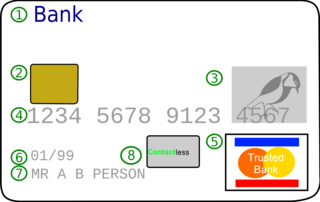A debit card is a payment card that can be used in place of cash to make purchases. It is similar to a credit card, but unlike a credit card, the money for the purchase must be in the cardholder's bank account at the time of a purchase and is immediately transferred directly from that account to the merchant’s account to pay for the purchase.

EMV is a payment method based upon a technical standard for smart payment cards and for payment terminals and automated teller machines which can accept them. EMV originally stood for "Europay, Mastercard, and Visa", the three companies that created the standard.

Dynamic currency conversion (DCC) or cardholder preferred currency (CPC) is a process whereby the amount of a credit card transaction is converted at the point of sale, ATM or internet to the currency of the card's country of issue. DCC is generally provided by third party operators in association with the merchant, and not by a card issuer, such as Visa or Mastercard. Card issuers permit DCC operators to offer DCC in accordance with the card issuers’ processing rules. However, using DCC, the customer is usually charged an amount in excess of the transaction amount converted at the normal exchange rate, though this may not be obviously disclosed to the customer at the time. The merchant, the merchant's bank or ATM operator usually impose a markup on the transaction, in addition to the exchange rate that would normally apply, sometimes by as much as 18%.
A chargeback is a return of money to a payer of some transaction, especially a credit card transaction.

An overdraft occurs when money is withdrawn in excess of what is on the current account. In this situation the account is said to be "overdrawn". If there is a prior agreement with the account provider for an overdraft, and the amount overdrawn is within the authorized overdraft limit, then interest is normally charged at the agreed rate. If the negative balance exceeds the agreed terms, then additional fees may be charged and higher interest rates may apply.
A merchant account is a type of bank account that allows businesses to accept payments in multiple ways, typically debit or credit cards. A merchant account is established under an agreement between an acceptor and a merchant acquiring bank for the settlement of payment card transactions. In some cases a payment processor, independent sales organization (ISO), or member service provider (MSP) is also a party to the merchant agreement. Whether a merchant enters into a merchant agreement directly with an acquiring bank or through an aggregator, the agreement contractually binds the merchant to obey the operating regulations established by the card associations. A high-risk merchant account is a business account or merchant account that allows the business to accept online payments though they are considered to be of high risk nature by the banks and credit card processors. The industries that possess this account are Adult Industry, Travel, Forex trading business, Multilevel Marketing business. High-Risk is the term that is used by the acquiring banks to signify industries or merchants that are involved with the higher financial risk.
Chargeback fraud, also known as friendly fraud, occurs when a consumer makes an online shopping purchase with their own credit card, and then requests a chargeback from the issuing bank after receiving the purchased goods or services. Once approved, the chargeback cancels the financial transaction, and the consumer receives a refund of the money they spent. Dependent on the payment method used, the merchant can be accountable when a chargeback occurs.

Payment cards are part of a payment system issued by financial institutions, such as a bank, to a customer that enables its owner to access the funds in the customer's designated bank accounts, or through a credit account and make payments by electronic acc transfer and access automated teller machines (ATMs). Such cards are known by a variety of names including bank cards, ATM cards, client cards, key cards or cash cards.
3-D Secure is a protocol designed to be an additional security layer for online credit and debit card transactions. The name refers to the "three domains" which interact using the protocol: the merchant/acquirer domain, the issuer domain, and the interoperability domain.
An acquiring bank is a bank or financial institution that processes credit or debit card payments on behalf of a merchant. The acquirer allows merchants to accept credit card payments from the card-issuing banks within an association. The best-known (credit) card associations are Visa, MasterCard, Discover, China UnionPay, American Express, Diners Club, Japan Credit Bureau and Indian Rupay.
Merchant Account Providers give businesses the ability to accept debit and credit cards in payment for goods and services. This can be face-to-face, on the telephone, or over the internet.
Internet fraud prevention is the act of stopping various types of internet fraud. Due to the many different ways of committing fraud over the Internet, such as stolen credit cards, identity theft, phishing, and chargebacks, users of the Internet, including online merchants, financial institutions and consumers who make online purchases, must make sure to avoid or minimize the risk of falling prey to such scams.

Credit card fraud is an inclusive term for fraud committed using a payment card, such as a credit card or debit card. The purpose may be to obtain goods or services or to make payment to another account, which is controlled by a criminal. The Payment Card Industry Data Security Standard is the data security standard created to help financial institutions process card payments securely and reduce card fraud.
An issuing bank is a bank that offers card association branded payment cards directly to consumers, such as credit cards, debit cards, contactless devices such as key fobs as well as prepaid cards. The name is derived from the practice of issuing cards to a consumer.

A credit card is a payment card issued to users (cardholders) to enable the cardholder to pay a merchant for goods and services based on the cardholder's accrued debt. The card issuer creates a revolving account and grants a line of credit to the cardholder, from which the cardholder can borrow money for payment to a merchant or as a cash advance. There are two credit card groups: consumer credit cards and business credit cards. Most cards are plastic, but some are metal cards, and a few gemstone-encrusted metal cards.
A payment processor is some sort of transactor for financial calculations, technically an invertible currency exchange appointed by a merchant to handle transactions from various channels such as credit cards and debit cards for merchant acquiring banks. They are usually broken down into two types: front-end and back-end.
Card schemes are payment networks linked to payment cards, such as debit or credit cards, of which a bank or any other eligible financial institution can become a member. By becoming a member of the scheme, the member then gets the possibility to issue cards or acquire merchants operating on the network of that card scheme. Visa and MasterCard are two of the largest global brands, known as card schemes, or card brands. Billions of transactions go through their cards on a yearly basis.

Rede known as Redecard is a Brazilian multi-brand acquirer with 25 brands in its portfolio, for credit, debit and benefit cards. Its activities include merchant acquiring, capturing, transmission, processing and settlement of credit and debit card transactions, prepayment of receivables to merchants, rental of POS terminals, check verification through POS terminals, credit card machine and the capture and transmission of transactions using benefit-voucher, private-label cards and loyalty programs such as Multiplus. The company is the first largest in its sector. The company was traded in BM&F Bovespa and disclosed in 2012, 24, September.
A card-not-present transaction is a payment card transaction made where the cardholder does not or cannot physically present the card for a merchant's visual examination at the time that an order is given and payment effected. It is most commonly used for payments made over Internet, but also mail-order transactions by mail or fax, or over the telephone.

A card security code is a series of numbers that, in addition to the bank card number, is embossed or printed on a card. The CSC is used as a security feature for card not present transactions, where a personal identification number (PIN) cannot be manually entered by the cardholder. It was instituted to reduce the incidence of credit card fraud.







